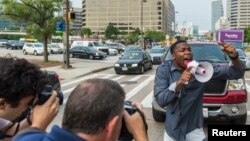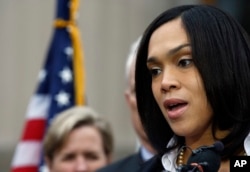A judge in the eastern U.S. city of Baltimore has refused to dismiss charges against six police officers in the death an African-American man who died while in police custody. The judge also ruled that each officer will be given a separate trial.
The ruling comes more than three months after 25-year-old Freddie Gray died from a severe spinal injury he suffered while handcuffed and restrained inside the police vehicle.
Gray’s case inflamed national debate over the death of young black men in police custody. It also sparked riots that prompted state and city officials to call in the National Guard and implement a citywide curfew.
The officers face charges that include second-degree assault, reckless endangerment and manslaughter. One of the six -- the driver of the police van where Gray's injuries took place -- faces an additional charge of second-degree murder.
All have entered pleas of "not guilty."
Though half of the officers charged are black, the case became a symbol of what protesters say is police brutality against African-Americans.
Motion to remove prosecutors
The judge also dismissed a defense motion to remove State Attorney Marilyn Mosby and other prosecutors from the case.
The defense argues that Mosby violated her obligation to ensure a fair trial by holding a highly-publicized open air news conference announcing the charges May 1.
Judge Barry Williams said that while he was “troubled” by some of the comments Mosby made, they did not compromise the defendants’ right to a fair trial.
Peaceful protests
Dozens of protesters marched peacefully through downtown Baltimore Wednesday carrying yellow signs with slogans including, “Stop Racism Now,” and "Jail Killer Police."
Demonstrations were held at police headquarters and outside of the courthouse where the hearing was taking place. The police department reported one arrest.
Gray was arrested on April 12. He died in a hospital a week later of the spinal cord injury. Prosecutors say Gray was unlawfully detained, and have disputed police accounts about a knife he was carrying.
His death brought to a boil long-simmering tensions between Baltimore police and poor neighborhoods in the largely black city -- culminating in rioting and looting that left hundreds of businesses damaged and resulted in a city-wide curfew.







